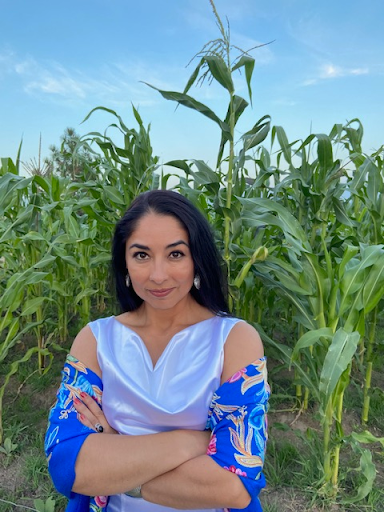Q&A with Dr. Christina Torres García
November 11, 2021
Meet Dr. Christina Torres García, CWU’S new director of the Latin American Studies Program and assistant professor in the Department of Communication (who will soon be moving to the Department of World Languages and Cultures in January). Torres García earned her doctorate in Cultural Studies and Social Thoughts in Education as well as her MBA at Washington State University. Torres García utilizes her expertise by serving as a powerful advocate for the Latino community.
Q: What got you interested in the field of Cultural Studies and Social Thoughts in Education?
A: As an immigrant from a farm working background, who spent her childhood selling goods in the streets of Mexico, I wanted to open my own business. I completed my Business Administration in Management Information System and Finance. Then, my Master in Business Administration. Later, I noticed that my passion was changing into teaching, so I applied to Cultural Studies and Social Thoughts in Education. What interested me in this field was the focus on issues of culture and power in the contemporary and historical contexts of education. My research focus lies at the intersections of social justice, Chicana feminist epistemologies, and critical race studies, which assisted me in my long advocacy and dedication to the values of equity and inclusion, and student success.
Q: You’ve mentioned how CWU has the resources to become the first four-year-University as a Hispanic Serving Institution (HSI). What exactly is an HSI, and what could we do to accomplish this goal?
A: In the most technical sense, Hispanic Serving Institutions (HSIs) are public and private, two- and four-year, not-for-profit, degree-granting postsecondary institutions that enroll at least 25% full-time equivalent enrollment (FTE) Latinx undergraduate students. Technically, the enrollment threshold is used to determine eligibility for federal designation as an HSI and eligible to receive additional grant funding.
Yet, becoming an HSI is more than meeting a quota. In my opinion, becoming an HSI is centralizing efforts and resources to become the best serving institutions for Latinx and other racially minoritized, low-income, and first-generation students. Of course, we might enter into a discussion about what it means to serve these students, which is precisely what the Equity Scorecard Steering Committee is already doing. CWU recognized that becoming a serving institution of diverse populations requires educational advancement and outcomes for students while also embracing their racial and cultural ways of knowing.
Therefore, I see a great opportunity and strong potential for CWU to become the first four-year Hispanic Serving Institution in Washington State. For instance, our advantages include our geographic location, the robust platform of federally funded student services programs already established, the active student body, the faculty and staff’s passion and commitment to serve, and of course, El Centro, which not only provide a minor in Latino, Latin American Studies but also several other certificates and services for all students not only Latinxs students.
We can accomplish this goal by increasing our desire to learn and grow toward an equitable, inclusive, and anti-racist community, building unity and investing in our future generations, which projects more diverse than ever.
Q: You’ve mentioned how a transformation and progression of culture begins at a personal level. If one wanted to enact change, how should one begin?
A: What I meant in my previous interview is that in order “to overcome the nation’s structural inequities, it is necessary to lead a transformative change within our own culture. We also must remember that transformation begins at a personal level. We need to pay attention to our own lives, work, and relationships as a first-place to practice justice and alignment with each other.” In other words, embarking on a path to overcome our structural inequities would require a profound transformation of how we think and act. For instance, we make hundreds of decisions a day; how many are focused on environmental sustainability, anti-racism, anti-sexism, anti-xenophobia, or even countering overt injustices, to name a few. To simplify my point, how many decisions do we make during our day focusing on building relations instead of destroying them, supporting inclusion and equity initiatives instead of maintaining status quo, open to transformative change instead of resisting it. As individuals, we should reflect on how our power and privilege could be utilized to advocate for equitable decisions. I firmly believe that we have an obligation to each other to go the extra mile and make sure we eliminate structural inequalities for our students.
Q: What are your favorite hobbies?
A: My favorite hobby is spending time with my family and my two dogs, Oso and Paloma (a German Shepherd and a Yellow Lab). I also love to harvest honey from our beehive and garden. But the most rewarding moments are spending time in conversations with my students who are climbing their ladders of academic success.
Q: What are your favorite foods?
A: Aguachile! As its name implies, Aguachile translates to “Chili water,” a much spicier version of Ceviche. Aguachile is reportedly originating in the Sinaloa region. Aguachile is made with shrimp, cucumber, onion, and lime juice, and the chilies are usually blended with water to create the marinade. This food is delicious, especially in hot summer.



Marge Andrews • Nov 20, 2021 at 9:01 am
Good luck on accomplishing this HSI goal soon!